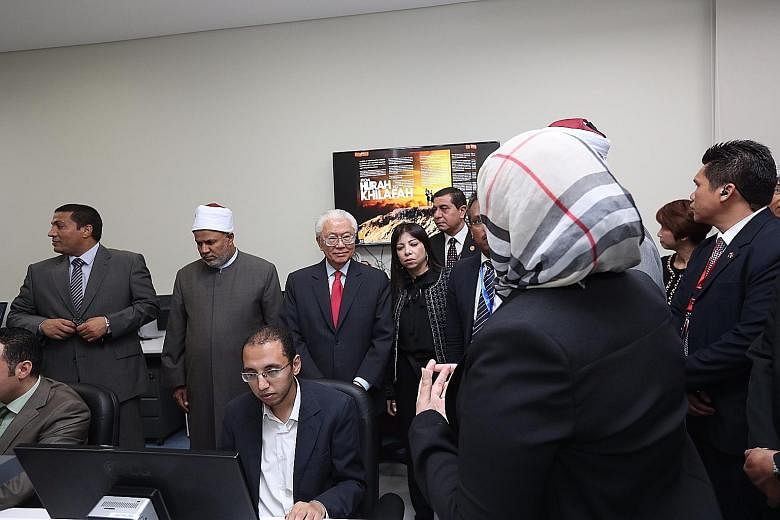Row upon row of computers - about 50 in total - fill a room in the Al Azhar University campus in eastern Cairo.
Here, religious scholars battle terrorists, not with guns but words from the Quran.
In this Al Azhar Observatory for Foreign Languages, they monitor extremist ideology online and trawl websites and social media in nine languages - including English, Mandarin and Urdu - before publishing rebuttals of their own.
The observatory is a key institution in Egypt's battle against religious extremism in the country and beyond.
President Tony Tan Keng Yam, who is on a state visit to Egypt, visited the "war room'' on Monday afternoon, after a meeting with Al Azhar's Grand Imam Ahmed Al Tayyeb, the top religious leader of the country's Muslim majority.
Dr Tan noted the important role Al Azhar, one of the world's oldest universities, played in training Singaporean Muslim leaders. Both men exchanged views on countering religious extremism and the importance of inter-faith dialogue.
The observatory was set up last year by Dr Al Tayyeb, a prominent Egyptian scholar who has called for tolerance in a region fractured by religious differences. He has been travelling around the world meeting and building bridges with leaders of other religions, including Pope Francis, whom he met in May, said his consultant for foreign relations, Mr Abdel Rahman Moussa.
He added that battling extremism is the Grand Imam's "main concern", and the observatory was set up to counter efforts by terrorist groups, such as the Islamic State in Iraq and Syria (ISIS), to use social media to radicalise converts.
"We decided to quickly establish this observatory... to answer and refute all these allegations and thoughts of the terrorist groups," said Mr Moussa.
The battle can be fierce. Some terror groups issue thousands of fallacious messages a day, he added.
The religious scholars hunt down these messages, analyse them and immediately shoot back online on the same social media platforms, using Islamic law and theology.
They "refute these ideas and explain to youth the proper thoughts and ideas, and how all these allegations... are false, and don't have any connection with Islam, Muslims and the Islamic cause", he said.
For instance, one common misconception is the idea that Muslims must establish and live in an Islamic state, or caliphate - a point ISIS pushes relentlessly.
Mr Moussa said there is no justification for an Islamic state in Islamic teachings, and added: "We are refuting all these ideas at the moment."
Yesterday, Dr Tan met Egyptian Prime Minister Sherif Ismail, who briefed him on Egypt's economic development plans and reform programmes. Mr Ismail welcomed investments from Singapore companies in sectors such as port and logistics, water desalination, information, communications and technology, as well as urban solutions.
Dr Tan said there is scope to strengthen economic relations as Singapore companies explore opportunities in Egypt.

